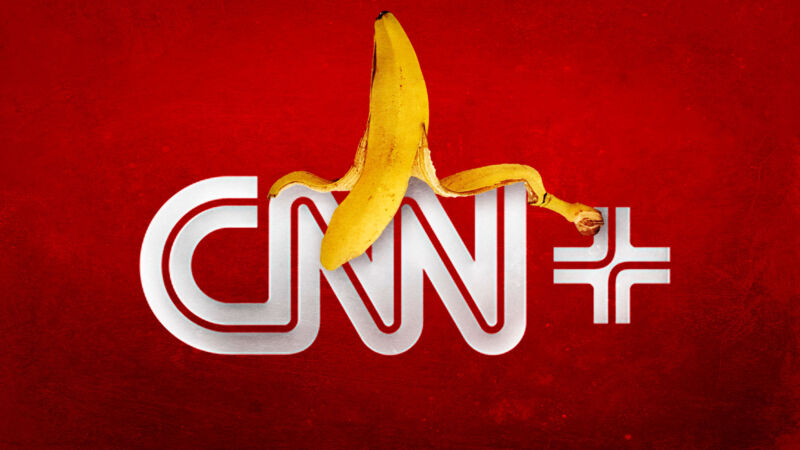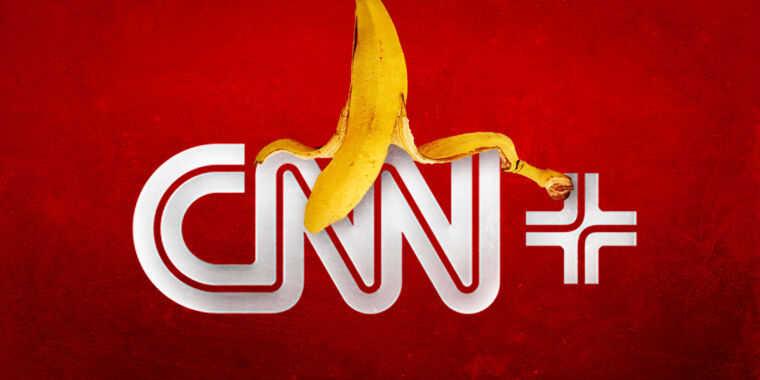
Aurich Lawson
CNN+, the streaming-only fork of CNN with a mix of exclusive content and the news network’s Video on Demand archives, will shut down at the end of the month—only 31 days after it debuted.
The service launched on March 29 as a $5.99 standalone service, despite coming from the same corporate family that’s loudly pushing HBO Max—and, thanks to a recent massive acquisition, also controls Discovery+. In a Wednesday statement on the CNN+ shutdown, current Warner Bros. Discovery President and CEO J.B. Perrette appeared to acknowledge the market reality of one-too-many streaming options: “In a complex streaming market, consumers want simplicity and an all-in[-one] service which provides a better experience and more value than stand-alone offerings.”
While CNN+ launched with high-profile exclusive hosts like former Fox News host Chris Wallace and NPR vet Audie Cornish, and reportedly met internal expectations with a subscriber count as high as 150,000, it also began life as part of the old AT&T Time Warner corporate structure. In the wake of Discovery’s acquisition of all things Time Warner from AT&T, Perrette and new CNN CEO and Chairman Chris Licht have repeatedly gone on the record expressing their interest in creating a single megaton streaming option for its combined media properties.
Perhaps worse for CNN+’s fate, two weeks before its launch, the leadership at Warner Bros. Discovery confirmed it was beginning the process of combining HBO Max and Discovery+ as a single streaming app.
“Some of this was avoidable”
As CNN itself has reported, a Wednesday town hall meeting hosted by Licht included allegations that the new Discovery leadership team’s hands were tied as far as coordinating a streaming-only CNN service with the outgoing CNN leadership, particularly former CNN head Jeff Zucker. Licht told CNN’s staff that he “could not legally communicate with CNN executives before the deal was official” about its own plans, and he added that “some of this was avoidable,” yet “prior leadership decided to just keep going.”
Statements made by Licht suggest that the company’s existing and future-planned CNN+ content may very well be rolled into a digital-only project not yet revealed, though leadership wasn’t ready to announce plans for, say, a special CNN hub on HBO Max.
Hopefully, whatever future plan comes to pass will include a smarter combination of CNN+’s streaming content and CNN’s live cable news feeds. The current CNN+ model requires anyone paying a $5.99/mo fee to add cable subscription credentials in order to watch live content, and only select cable providers are currently compatible with this sign-in process.
In addition to the loud distraction of a merger and lead executives coming and going, CNN+’s emergence arguably wasn’t helped by former corporate parent AT&T Time Warner’s financial woes in the telecom space. Plummeting DirecTV subscriber numbers, in particular, cursed AT&T Time Warner for most of the time that it operated the satellite-TV provider, and it elected to spin DirecTV off as a subsidiary in August 2021.
The previous speedrun record for a big-league streaming shutdown belonged to Quibi, which lasted close to eight months. Quibi managed to burn through over $1.75 billion in talent acquisition and promotions before shutting down less than a year after it launched as a “smartphone-focused” streaming-video service. Its remnants were eventually picked up by Roku for pennies on the dollar.








